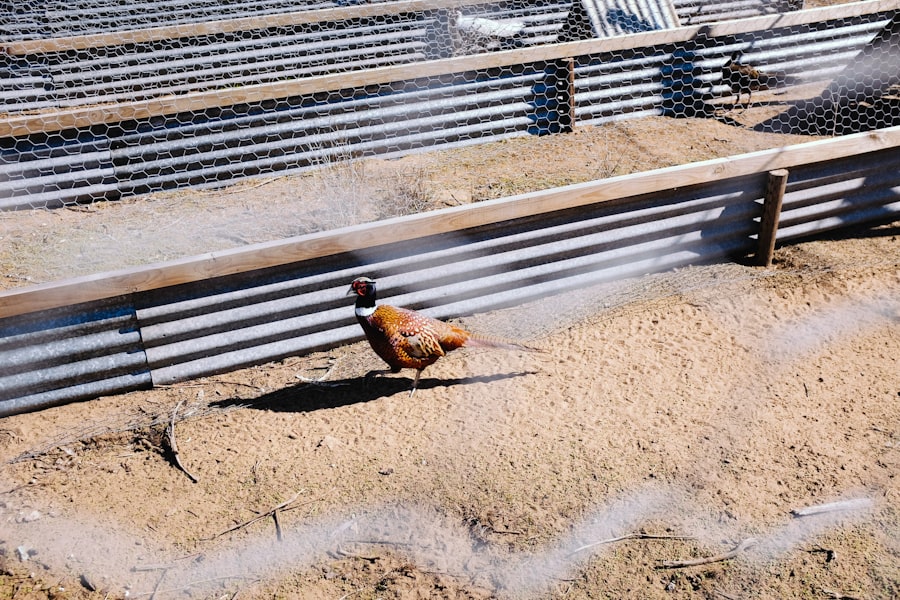Chickens are social creatures that thrive in flocks. They possess a natural foraging instinct, which involves pecking at the ground to find insects, seeds, and plants. Scratching the earth to uncover hidden food and dust bathing for cleanliness and parasite control are also typical behaviors.
These innate tendencies are crucial to consider when managing chickens’ interaction with grass seed. Curiosity is a prominent trait in chickens, leading them to investigate new elements in their environment, including freshly planted grass seed. Their actions are not intentionally destructive but rather a manifestation of their natural instincts.
The social hierarchy within a flock, known as the pecking order, influences chicken behavior. Dominant individuals tend to be more assertive and inquisitive, often leading the more submissive members. This dynamic affects how chickens interact with grass seed and other environmental elements.
Chickens are creatures of habit that benefit from consistency in their routines and surroundings. Changes to their environment, such as the introduction of grass seed, can cause stress or agitation. Understanding these behavioral patterns is essential for maintaining a balance between the chickens’ natural instincts and the need to protect newly planted grass seed.
Table of Contents
- 1 Choosing the right feeding options for chickens
- 2 Creating a designated area for grass seed planting
- 3 Implementing deterrents to keep chickens away from grass seed
- 4 Providing alternative sources of entertainment and nutrition for chickens
- 5 Monitoring and adjusting feeding habits
- 6 Seeking professional advice for specific concerns
- 7 FAQs
- 7.1 What are some methods to keep chickens from eating grass seed?
- 7.2 Why is it important to keep chickens from eating grass seed?
- 7.3 How can chicken wire be used to keep chickens from eating grass seed?
- 7.4 What is a chicken tractor and how can it help keep chickens from eating grass seed?
- 7.5 What are some alternative sources of food that can be provided to distract the chickens from eating grass seed?
Key Takeaways
- Chickens are social animals and exhibit natural behaviors such as scratching, pecking, and dust bathing.
- Consider the age, breed, and purpose of the chickens when choosing the right feeding options.
- Designate a specific area for grass seed planting to provide chickens with a natural source of nutrition and entertainment.
- Implement deterrents such as fencing or netting to keep chickens away from newly planted grass seed.
- Provide alternative sources of entertainment and nutrition such as hanging treats or installing chicken toys.
Choosing the right feeding options for chickens
Commercial Chicken Feed
Commercial chicken feed is formulated to provide the essential nutrients that chickens need to thrive. It typically comes in pellet or crumble form and is designed to be a complete and balanced diet for chickens.
Alternative Feeding Options
Scratch grains, on the other hand, are a mixture of whole grains such as corn, wheat, and barley. While scratch grains can be a tasty treat for chickens, they should not be the primary source of nutrition as they lack the essential vitamins and minerals found in commercial feed. Kitchen scraps can also be fed to chickens as a supplement to their diet, but it’s important to avoid feeding them foods that are high in salt, sugar, or fat.
Considerations for Choosing the Right Feed
When choosing the right feeding options for chickens, it’s important to consider their age, breed, and individual dietary needs. For example, laying hens may require a different type of feed that is higher in calcium to support egg production. Additionally, certain breeds of chickens may have specific dietary requirements that should be taken into account when selecting their feed. It’s also important to provide access to clean water at all times to ensure that chickens stay hydrated and healthy.
Feeding Methods and Mental Stimulation
In addition to providing a balanced diet, it’s important to consider the feeding method for chickens. Some chicken owners prefer to use a traditional feeder that dispenses feed on demand, while others may opt for a more interactive feeding method such as scatter feeding or using a treat ball. The feeding method can impact how chickens interact with their food and can also provide mental stimulation and enrichment. By choosing the right feeding options for chickens, you can support their nutritional needs while also promoting their natural behaviors and overall well-being.
Creating a designated area for grass seed planting
Creating a designated area for grass seed planting is essential for protecting the seeds from being disturbed by chickens. This can be achieved by setting up a temporary barrier or enclosure around the planting area to prevent chickens from accessing it. The barrier can be made from materials such as chicken wire, plastic fencing, or wooden stakes.
It’s important to ensure that the barrier is secure and tall enough to prevent chickens from flying or jumping over it. Additionally, placing signs or visual markers around the planting area can help deter chickens from approaching it. Another option for creating a designated area for grass seed planting is to use raised garden beds or containers.
This can help elevate the grass seed out of reach from chickens while still allowing it to receive sunlight and water. Raised garden beds or containers can also provide a more controlled environment for the grass seed to germinate and grow without the risk of being disturbed by chickens. It’s important to consider the location of the designated planting area when creating it.
Choosing a spot that is away from high-traffic areas or areas where chickens typically roam can help minimize the risk of them coming into contact with the grass seed. By creating a designated area for grass seed planting, you can protect the seeds from being disturbed by chickens while still allowing them to roam freely in other areas of their environment.
Implementing deterrents to keep chickens away from grass seed
Implementing deterrents can be an effective way to keep chickens away from grass seed without causing harm to them. One option is to use natural deterrents such as citrus peels, garlic cloves, or hot pepper flakes scattered around the planting area. Chickens have a strong sense of smell and taste, and these natural deterrents can help deter them from approaching the grass seed.
Another natural deterrent is using predator decoys such as fake owls or hawks, which can create the illusion of danger and discourage chickens from venturing near the planting area. Physical barriers can also be used as deterrents to keep chickens away from grass seed. This can include using chicken wire or netting to cover the planting area and prevent chickens from accessing it.
It’s important to ensure that the barrier is secure and properly installed to effectively keep chickens at bay. Additionally, using visual deterrents such as scarecrows or reflective tape can help deter chickens by creating visual disturbances that make them feel uneasy about approaching the planting area. Another effective deterrent is using sound or motion-activated devices that emit loud noises or sudden movements when triggered by chicken activity.
This can startle chickens and discourage them from approaching the planting area. It’s important to use these devices sparingly and considerate of neighboring properties to avoid causing unnecessary disturbances. By implementing deterrents to keep chickens away from grass seed, you can protect the seeds from being disturbed while still allowing your chickens to roam freely in other areas of their environment.
Providing alternative sources of entertainment and nutrition for chickens
Providing alternative sources of entertainment and nutrition for chickens can help redirect their attention away from the grass seed and minimize their desire to investigate it. One option is to provide enrichment activities such as hanging treats or toys in their environment that encourage natural behaviors such as pecking, scratching, and jumping. This can help keep chickens mentally stimulated and engaged, reducing their interest in exploring areas where they shouldn’t be.
Another alternative source of entertainment for chickens is providing them with access to a dust bathing area. Chickens naturally engage in dust bathing as a way to keep themselves clean and free from parasites. By providing them with a designated dust bathing area filled with sand or fine dirt, you can encourage this natural behavior and provide them with a source of entertainment and relaxation.
In addition to entertainment, providing alternative sources of nutrition for chickens can help satisfy their natural foraging instincts and reduce their interest in exploring the grass seed. This can include scattering scratch grains or kitchen scraps in designated areas away from the planting site to encourage them to forage in those areas instead. By providing alternative sources of entertainment and nutrition for chickens, you can help redirect their attention away from the grass seed while still promoting their natural behaviors and overall well-being.
Monitoring and adjusting feeding habits

Identifying Feeding Pattern Issues
Observing your chickens’ feeding patterns can help you detect any problems. For instance, if you notice that your chickens consistently peck at the ground near the planting area, it may indicate that they lack enrichment or stimulation in their environment.
Adjusting Feeding Habits for Optimal Health
Monitoring your chickens’ overall health and body condition is vital to ensure they receive proper nutrition from their diet. Adjusting their feeding habits may involve making changes to their diet or feeding method based on their individual needs and behaviors. For example, laying hens may require adjustments to their feed to support egg production or additional calcium sources.
Minimizing Interest in Restricted Areas
Observing how your chickens interact with the designated planting area for grass seed is also essential. If they consistently attempt to access the area despite deterrents, it may be necessary to reassess your approach and make adjustments as needed. By monitoring and adjusting feeding habits, you can provide your chickens with the proper nutrition and enrichment they need while minimizing their interest in exploring restricted areas.
Seeking professional advice for specific concerns
Seeking professional advice for specific concerns related to managing chicken behavior around grass seed is essential for addressing any challenges or issues that may arise. A poultry veterinarian or experienced chicken behavior specialist can provide valuable insights and recommendations based on their expertise and knowledge of chicken behavior. If you are experiencing persistent challenges with managing chicken behavior around grass seed despite implementing various strategies, seeking professional advice can help identify underlying factors that may be contributing to the issue.
A professional can conduct a thorough assessment of your chicken’s environment, diet, and behavior to identify any potential triggers or stressors that may be influencing their behavior. In addition to seeking professional advice for specific concerns, connecting with other chicken owners or joining online forums and communities can provide valuable support and insights from individuals who have experience managing similar challenges with their own flocks. By seeking professional advice for specific concerns related to managing chicken behavior around grass seed, you can gain access to expert guidance and support that can help address any challenges or issues effectively.
In conclusion, understanding the behavior of chickens is crucial for managing their interaction with grass seed while still allowing them to exhibit their natural instincts. Choosing the right feeding options for chickens is essential for supporting their nutritional needs and overall well-being. Creating a designated area for grass seed planting and implementing deterrents are effective strategies for protecting the seeds from being disturbed by chickens.
Providing alternative sources of entertainment and nutrition for chickens can help redirect their attention away from the grass seed. Monitoring and adjusting feeding habits is important for ensuring that chickens receive proper nutrition while minimizing their interest in exploring areas where they shouldn’t be. Seeking professional advice for specific concerns related to managing chicken behavior around grass seed can provide valuable insights and recommendations for addressing any challenges or issues that may arise.
By implementing these strategies and seeking expert guidance when needed, you can effectively manage chicken behavior around grass seed while promoting their overall health and well-being.
If you’re looking for more tips on keeping chickens, you might want to check out this article on creating a farmhouse chicken coop. It offers great advice on how to design a coop that will keep your chickens happy and healthy.
FAQs
What are some methods to keep chickens from eating grass seed?
Some methods to keep chickens from eating grass seed include using chicken wire to create a barrier, using a chicken tractor to move the chickens to a different area, and providing alternative sources of food to distract the chickens.
Why is it important to keep chickens from eating grass seed?
It is important to keep chickens from eating grass seed because it can prevent the grass from growing and can lead to bare patches in the lawn or garden.
How can chicken wire be used to keep chickens from eating grass seed?
Chicken wire can be used to create a barrier around the area where grass seed has been planted. This will prevent the chickens from accessing the seed and allow the grass to grow undisturbed.
What is a chicken tractor and how can it help keep chickens from eating grass seed?
A chicken tractor is a portable enclosure that can be moved around the lawn or garden. By moving the chickens to a different area, the grass seed can be given a chance to grow without being eaten by the chickens.
What are some alternative sources of food that can be provided to distract the chickens from eating grass seed?
Some alternative sources of food that can be provided to distract the chickens from eating grass seed include scratch grains, mealworms, and kitchen scraps. These can be scattered in a different area to encourage the chickens to forage there instead of in the area where grass seed has been planted.
Meet Walter, the feathered-friend fanatic of Florida! Nestled in the sunshine state, Walter struts through life with his feathered companions, clucking his way to happiness. With a coop that’s fancier than a five-star hotel, he’s the Don Juan of the chicken world. When he’s not teaching his hens to do the cha-cha, you’ll find him in a heated debate with his prized rooster, Sir Clucks-a-Lot. Walter’s poultry passion is no yolk; he’s the sunny-side-up guy you never knew you needed in your flock of friends!







